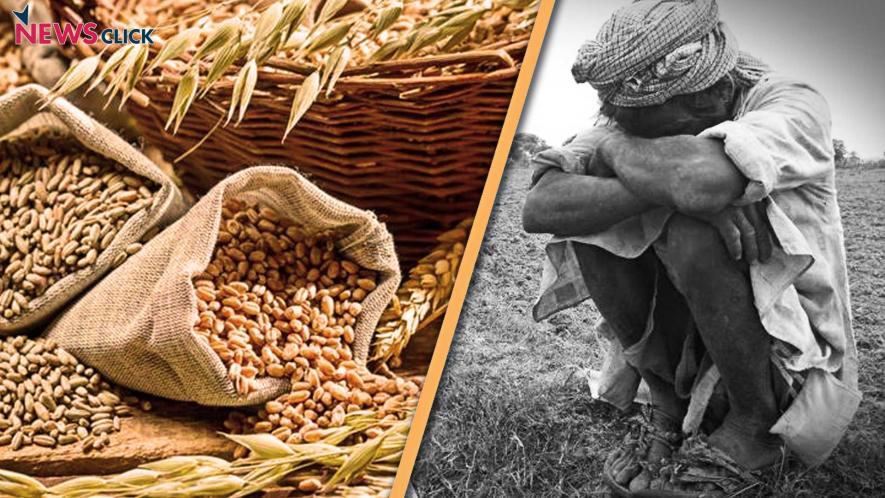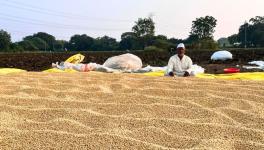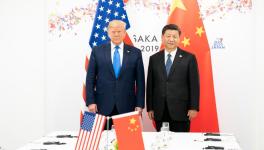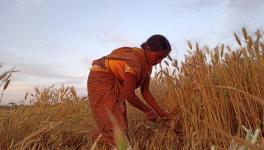Assurances Not Enough to Convince Farmers on Security of MSP Regime

Have the three new farm laws compromised India’s long-held strategy to link agriculture with national food security and protect rural livelihoods? This link has been India’s stated position at the WTO for three post-liberalisation decades since the early 1990s and protects the interests of its poor and economically marginalised population. But it has now been thrown out of the window by the controversial legislations which expose agriculture to the global market.
The move, according to critics, is ominous and does not augur well for farming communities. A recent study, India Compromises its WTO Strategy: A Critical Look at the 2020 Agricultural Market Reforms details several of these concerns. The analysis published by the think tank Focus on the Global South (Focus), with support from the Rosa Luxemburg Stiftung-South Asia office and funding by the German Federal Ministry for Economic Cooperation and Development—notes that the agriculture sector, dominated by marginal farmers, may not be able to “withstand major disruptions caused by import competition and the attendant uncertainties of the global market”.
According to the report, the deregulation of the agriculture sector through the legislations are directed at “promoting exports and making India an agricultural export hub.” But this comes with the attendant risk of international players like Australia, the United States, and the European Union demanding that there be a level playing field and they be allowed to operate in India. This would expose the vulnerabilities of the farm sector which supports 60% of India’s workforce.
The focus of the farm laws is at variance with India’s earlier stand. It had so far maintained at WTO deliberations that its policies were based on “non-trade” concerns, and that essential agricultural commodities must be kept out of import tariff lowering negotiations. The Focus report notes that India’s interventions in the WTO highlighted the importance of food security and rural livelihoods for developing countries.
In its first statement on the issue, released on 18 November 1998, India argued that it would be “too simplistic to assume that agricultural liberalisation…would by itself, be able to overcome the problems of food security for developing countries with a sizeable rural population”.
Since the farm laws were passed in September, the government has been insisting that adequate safeguards for farmers have been provided in the new laws. But the Focus report, authored by Biswajit Dhar, professor of economics at the Centre for Economic Studies and Planning, JNU, points out that is no real protection offered to farmers in the laws in their present form.
The first of these laws, the Farmers (Empowerment and Protection) Agreement on Price Assurance and Farm Services Act, 2020 supposedly “empowers and protects” farmers to deal with big traders and agri-business firms. But that is the stated purpose. To quote from Dhar’s report: “Clearly the legislation does not provide for any means of effectively protecting or empowering farmers. The government may at most issue ‘necessary guidelines along with model farming agreements’, thereby facilitating farmers to enter into written farming agreements. Even as the legislation seems to be on the threshold of getting implemented, the model farming agreements are yet to be notified.”
The Farmers’ Produce Trade and Commerce (Promotion and Facilitation) Act, 2020, provides “freedom of choice” vis-a-vis the sale and purchase of farm produce through barrier-free trade across the country. But Dhar wonders if this will provide a level playing field with large businesses when 86% of farm holdings are of less than two hectares. The farmer would be at a disadvantage in any price negotiation and is not likely to get remunerative prices.
The government has also noted that agreements between farmers and big businesses will be to the former’s advantage since it will “attract” investments into agriculture and “promote inclusiveness” which will allow farmers access to the inputs and markets. This spin to the so-called reforms and their inclusiveness is misleading.
Notes the Focus report: “In total contrast to the manner in which the term ‘inclusiveness’ is used in development literature implying improving the condition of the marginalised sections of people, the government seems to have used the term to facilitate the entry of large businesses and traders, which this Act seeks to legitimise.
“Contrary to the protection and empowerment that the official title of the Act suggests, it has several provisions that militate against the interests of small farmers… It allows conditions to be imposed for compliance with quality, grade, and standards of the products, which may be ‘formulated by any agency of the Central Government or the State Governments, or any agency authorised by such Government for this purpose’.”
But the new laws, with no explicit mention of the continuity of the Minimum Support Price, also put a question mark on the future of the Public Distribution System and the National Food Security Act (NFSA), 2013. The Act currently provides subsidised grains to 75% and 50% respectively of the poor population in rural and urban areas.
The NFSA runs courtesy some interim relaxations made by the WTO in 2013, which allowed developing countries to acquire food grains from resource-poor producers for distribution among the poor and economically marginalised without being challenged at the WTO. But this arrangement came with conditions: public stockholding for the PDS will be subject to scrutiny and audit by the WTO and subsidised stocks cannot be exported.
The Focus report notes that India has been “consistently” questioned about its export of agricultural products. In recent months, it has been asked in the “Committee on Agriculture on whether it grants export subsidies to non-Basmati rice, and whether the sales of government-held wheat stocks in the open market are not exported. India is currently facing a dispute brought by six countries who have questioned the legality of its subsidies granted to sugar.”
With no MSP regime, many experts believe, the PDS as we know it will cease to exist. They point out that deregulation of agriculture may end up with direct cash transfers or the issue of food stamps to the poor. They will have to then procure grains from the open market where prices are subject to fluctuation and manipulation by the bigger players.
On its part, the government has been maintaining that there is no plan to do away with MSP or dismantling the PDS. But it requires a law, not just verbal assurances, to convince farmers who have lost faith in the promises made by politicians.
The writer is a senior journalist and author. The views are personal
Get the latest reports & analysis with people's perspective on Protests, movements & deep analytical videos, discussions of the current affairs in your Telegram app. Subscribe to NewsClick's Telegram channel & get Real-Time updates on stories, as they get published on our website.
























